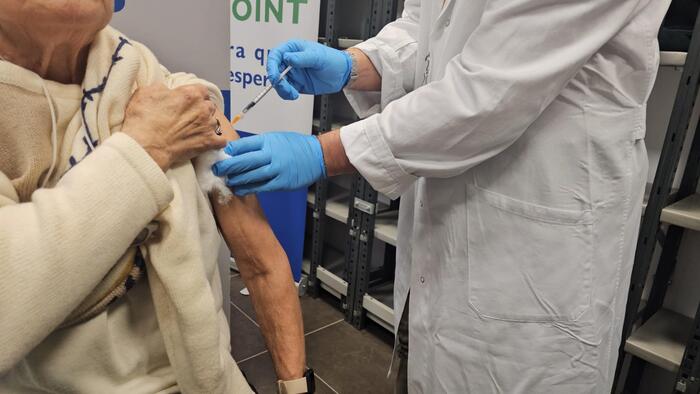A man receives the AstraZeneca vaccine this Thursday in Seville.PACO PUENTES / EL PAÍS
For weeks, the health authorities have been repeating that the vaccine funnel was in the supply: they were put as many as they arrived and the rate could not rise because there were no more.
And the data supported this claim.
After the hesitation of the first bars, by the end of each week practically all the received ones had been punctured.
But not anymore.
As more vials have arrived, especially since the AstraZeneca remittances were incorporated, the line that marks the doses administered is becoming increasingly distant from those received.
Much of the problem is organization.
It is no longer a question of prodding limited groups, such as residences or toilets, which are easy to locate and group.
Now immunization has spread to a larger population, with essential workers and those over 80 years of age, and the start-up is not being equally diligent in all the autonomous communities.
The challenge of vaccinating 7,000 large dependents in one week
How Vaccine Delays Really Affect Spain
The general trend is clear: on February 2, 94% of the total vaccines received had been punctured.
The percentage dropped to 90% on February 9 and on the 23rd it was 87%.
In the last week, only three-quarters of the vaccines that arrived were inoculated.
These are the latest comparable data, as the latest batches received have not yet been administered, the highest quantity to date: 886,880 new doses.
Until next Tuesday it will not be possible to verify if the rhythm continues to drop or has accelerated after greasing the machinery to summon and vaccinate essential workers and the elderly, which are also beginning these days in most communities.
Of the three vaccines that are administered, there is one that clearly lags behind the others: AstraZeneca's, the latest to arrive and the one being used for essential workers under the age of 55: the security forces and bodies of the state, teachers, military, emergency personnel and prison officials.
On February 23 (last day of comparable data) 95.5% of the Pfizer doses, 70.8% of Moderna and only 33.7% of AstraZeneca doses had been placed.
What happens, in the words of María José García, spokesperson for the Satse nurses union, is that so far “the easy part” has been done.
“There were the residents, who all live in the same place, and the health workers, which has been the fastest because they are easy to locate in the centers where they are vaccinated.
Now with the large dependents at home and essential workers, it is complicated.
The first, for logistics: you have to go to each house.
The seconds, by volume ”, he points out.
Both García and Pablo Aldaz, from the Spanish Society of Family and Community Medicine, agree that the main obstacle today is not that of the staff, but the organization.
García emphasizes that there are 17 different realities depending on each autonomous community.
Asked last Wednesday about these problems, the Minister of Health, Carolina Darias, replied that progress continues apace and that the communities are preparing their operational plans so that the doses that arrive and those to come are punctured as quickly as possible.
But in each community the casuistry is different.
Even the order of vaccination: although the strategy is national, some have overlapped the priority groups more than others or have even altered the order.
Madrid, for example, punctured the toilets before many residents.
The same is true for essential personnel.
According to data from Satse, some (such as Castilla y León and Aragón) have not yet started;
Others have done it with the police (the case of the Canary Islands), others with teachers (something that happens in Galicia) and some go simultaneously.
This process is also progressive.
It kicks in little by little, which may explain the delay in getting the AstraZeneca shots.
And once it starts, it is not without its complications.
In Galicia, the first day was "chaotic" in the words of some workers, since the delay in the delivery of vaccines from Santiago caused long queues in hospitals.
In addition, the unions denounced that there were teachers without citing and yet others were summoned to whom the injection of AstraZeneca corresponded to us by age.
The majority union in Galician education, CIG, has denounced “improvisation and disorganization”.
In the Valencian Community, according to data from the Generalitat itself, only 12% of Anglo-Swedish vaccines have been administered.
There they are prodding second-line health personnel, but they have not yet started with the teachers, which is the largest group among essential workers under 55. The Ministry of Health does not consider that it is delayed.
"The autonomous communities are being cautious to guarantee the second dose to all those inoculated and that conditions the vaccination rates," explains a spokesperson.
In the Basque Country they are saving half of the doses for the second puncture, which means that not all of them are used.
There, the unions have also criticized the organization of the process: 53.2% of the doctors consulted by the Euskadi medical union have described the campaign as "terrible" and another 26.9% consider it "bad".
Only 4.1% of doctors give a pass.
In addition, in this and other communities, such as Castilla y León, the delays in the arrival of Moderna vaccines, which did not deliver all those committed this week, are also preventing the expected rhythm from being reached, forcing a reorganization of agendas.
In the case of Madrid, which began this Thursday with essential workers at the Wanda Metropolitano stadium and with those over 80 in health centers, the medical and nursing unions have denounced "improvisation and chaos."
They assure that the Community of Madrid has sent them lists of outdated patients, and that they sometimes included deaths.
Satse adds that this community continues to use syringes with which it is not possible to remove the sixth dose from the Pfizer vials, which continues to waste doses.
At the other extreme, the Junta de Andalucía assures that it administers all those it receives, that it does not save for second doses due to the longer time that there is with those of AstraZeneca (up to 12 weeks) and that this week it will begin to vaccinate teachers in in their thirties, after starting at 55 years old and progressively decreasing in age.
In other countries, such as Germany, there has been an added problem: the rejection of a good number of people of the AstraZeneca vaccine due to its lower effectiveness in clinical trials.
This does not seem to be the case in Spain.
Although there have been specific cases, the Secretary of State for Health assured this Thursday that only 2% of the people who have been offered have rejected the vaccine.
And within this percentage are also those who could not receive it for medical reasons.
In the coming weeks the number of vials that will arrive will only increase, according to forecasts, which although they are not always being strictly adhered to, they have been correct in predicting that there would be more and more.
It will then be seen if these organizational problems persist.
But there the personnel factor will come into play.
Aldaz assures that although now health centers are able to administer the rate of doses that arrive, this will not be possible when they are doubled, something that has to happen in the second and third trimesters to reach the goal of immunizing 70% of the population. population before the end of summer.
At double doses, it will take 2.1 million weekly punctures in those six months to achieve the goal, although they will be less, since from April, predictably, the Janssen vaccines will begin, which only require one injection, which it will ease the process.
What is not yet known is how many of these will Spain have.
The drug's approval by the European Union, scheduled between March 8 and 12, is still pending.
With information from
C. Vázquez, C. Huete, B. Coll, E. Saiz, J. Navarro, L. Bohórquez, S. Norte and M. Ormazabal.









